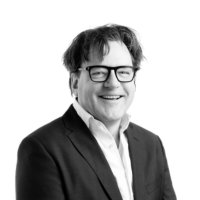How to make complex issues manageable
In a series of interviews, we are putting the colleagues from our interim network in the spotlight. Who are they? What do they enjoy about the field of interim management? And what gives them energy? For this interview, we had a conversation with Theun Creton.

What do you enjoy most about your profession?
The most enjoyable aspect remains the collaborative puzzle-solving, building, and discovering untapped talent along the way. Originally, I'm an econometrician, so I have an affinity for solving puzzles, or in other words, making complex issues manageable. However, I'm not someone who is solely focused on models. Models serve people, and I find the human element much more interesting. Every assignment starts with the question: why am I legitimately at this table? By doing this, we collectively clarify the problem at hand, and I find my place within the team. Interaction is my driving force. I'm genuinely interested in what motivates people. Additionally, I believe that individuals themselves know best what they need. I often find myself saying, 'your manager needs your guidance.' Even the answers to major strategic questions are, for the most part, consciously or unconsciously present in those who execute the work. Bringing these answers to light and effectively utilizing them provides a tremendous sense of satisfaction and energy. I find myself carried along by this energy.
What type of assignment excites you?
It can't be complex enough for me. Where others might back away, I become engaged. This often coincides with the moment the client approaches you because the organization is stuck. Of course, one assignment can be more complex than another. So, give me the extremely complex one. Complexity involves a layered combination of content, context, dynamics, direction, and decision-making. It always requires a multidisciplinary approach, not only within the organization but also with active stakeholder involvement. For instance, during the COVID-19 crisis, I worked with a team from a Regional Public Health Service that suddenly faced a significant challenge. While researchers would typically have months to conduct their studies, we now needed answers within two weeks, as community measures couldn't wait. This situation led to the creation of a short-cycle approach, involving gathering input directly from the community, analysis by researchers, and the development of interventions for swift and efficient application. This required a drastically different way of thinking and working. Maybe not overly complex in normal circumstances, but coupled with the entire crisis context, it became intricate.
What is your most significant achievement so far?
Several successes come to mind, and it's challenging to compare them. However, I'm thinking about a project that I'm proud of because it was incredibly complex and continues to be successful. In a consortium comprising a University, a University of Applied Sciences, and Primary and Secondary education, we shaped academic workspaces. The goal was to develop interventions that could be directly applied 'in and around' the classroom. This was quite a challenge. If you're familiar with the education sector, you know that there are numerous stakeholders with completely different interests. It was truly a multidisciplinary endeavor. I visited various places and spoke to everyone. From that, I distilled the common thread and formulated an approach that resonated with the majority. We secured funding from The Hague for initial practical research and simultaneously refined the workshop concept during execution. The consortium continues to yield results, and teachers genuinely benefit from it. Another success was a project for the Municipality of Amsterdam. The question was: how do you translate the coalition agreement into what's needed in the neighborhoods? This required facilitating discussions between 30 directorates and 20 districts. It's quite a matrix where specific content is linked to the areas that require it. For this, we developed the so-called 'District Cycle,' involving professionals from nearly all departments of the Municipality of Amsterdam. Based on my experience, a broadly applicable system can only work if the professionals build it themselves. Thus, they developed a yearly cycle that included a district monitor providing input for multi-year plans and translating them into an action plan for the upcoming year. Just scheduling effective discussions between the 30 directorates and 20 districts is a significant challenge. Adding to that, the toolkit needs to be straightforward, user-friendly, and efficient in bringing the content to the table. Such an assignment demands utmost sensitivity and tactical acumen, but it also awakens the econometrician in me. After all, I aim to make complexity as manageable and practical as possible.
What is the driving force behind your work?
Ten years ago, I spearheaded a reorganization at a major telecom organization. When I talk about it, I mention a specific professional who was virtually invisible, stationed at a desk in a remote corner. During my project, he emerged as a valuable and creative force. Subsequently, he joined a management development program and has become the kind of manager you wish for in a team. In essence, harnessing talent is what drives me. That's what energizes me. This is why I'm extensively involved in programs focused on continuous learning. Furthermore, I believe that most questions' answers should come from professionals and frontline employees. They encounter issues and grievances and often possess excellent ideas. I view it as my role to establish sustainable vertical interaction between the workforce and the leadership. When you make such a system an integral part of daily work, you've got one of the most crucial building blocks for a continuously learning organization with a solid foundation for change capacity.
How does this align with the Highberg interim network?
I think the alignment we share is that both of us work on the vertical line from leadership to frontline employees. Additionally, we share the same motto: 'It. Can. Be. Better.' That's my fundamental stance. And I don't mean to criticize the current state of affairs. My motivation is truly about understanding the reasons behind behaviors. From a curious perspective. Being open to this makes it more enjoyable.
How do you contribute to the network?
In addition to interim assignments, I guide management teams and leadership. I'm brought in by colleagues on ongoing projects when an intervention is required. Furthermore, I refer fellow interims to my clients. Lastly, I frequently exchange ideas with colleagues regarding situations they're facing. Collaborative puzzle-solving, discovery, and learning. I find this enjoyable, both with my fellow interims and with clients.
Is your organization in need of change capacity? Do you want to achieve the desired change from within? Or do you simply want to know more about the Highberg interim manager network? Contact us now!

Related insights
